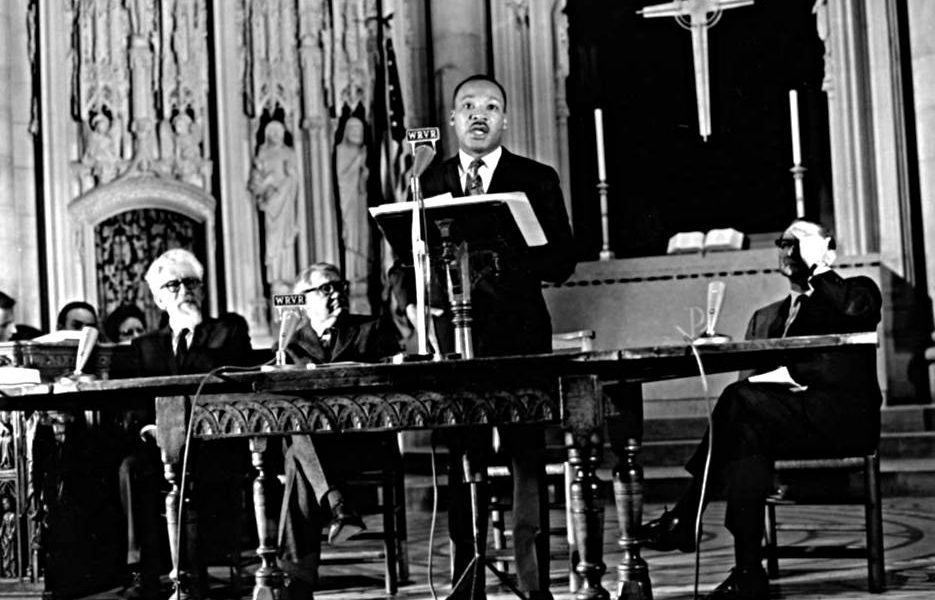
Fifty years ago yesterday, the Rev. Dr. Martin Luther King, Jr. called for a revolution of values against racism, poverty, and militarism in his historic “Beyond Vietnam: A Time to Break the Silence” speech at Riverside Church in New York City. We commemorated the anniversary in a number of ways, but most especially by continuing the call for a New Poor People’s Campaign to unite the poor and dispossessed and take up the unfinished business of Dr. King’s last campaign, the Poor People’s Campaign of 1968.
[aesop_image img=”https://kairoscenter.org/wp-content/uploads/2017/03/April-4th-1.png” alt=”Martin Luther King Beyond Vietnam” align=”center” lightbox=”on” captionposition=”left” revealfx=”off”]
This retrospective will highlight some of the ways we marked the anniversary of “Beyond Vietnam,” including the launch of the first episode of “America Will Be,” a 3-part documentary series by Dara Kell that features the voices and faces of the New Poor People’s Campaign across the country, highlighting the ways poor people are coming together to go on the offensive in the struggle against the root causes of racism, war, poverty, and the climate crisis.
Watch
[aesop_video align=”center” src=”youtube” id=”Gy4yXxqGMrE” disable_for_mobile=”on” loop=”on” autoplay=”off” controls=”on” viewstart=”off” viewend=”on” revealfx=”off”]
“America Will Be” is an inspiring look at how poor and working people are uniting across racial, class, geographic and religious lines to end poverty in this country. The film is a collaboration between the Kairos Center, the Poor People’s Campaign (which includes more than 50 organizations), award-winning filmmaker Dara Kell, and our network of media makers, including Media Mobilizing Project, Fusion Films, and more.
[aesop_video align=”center” src=”youtube” id=”L6ODXmFIlTE” disable_for_mobile=”on” loop=”on” autoplay=”on” controls=”on” viewstart=”on” viewend=”on” revealfx=”off”]
On Sunday, April 2, Rev. Dr. William J. Barber, II of Repairers of the Breach preached a sermon, “When Silence is Not an Option,” from the pulpit of the historic Riverside Church where Dr. King preached “Beyond Vietnam.” Fusion Films recorded the sermon live from New York City — watch it here.
[aesop_video align=”center” src=”youtube” id=”s6ykt_6sJlA” disable_for_mobile=”on” loop=”on” autoplay=”off” controls=”on” viewstart=”off” viewend=”on” revealfx=”off”]
On April 3, Rev. Dr. Liz Theoharis and Shailly Gupta Barnes of the Kairos Center, Rev. Barber, and Rev. Dr. James A. Forbes, Jr. were joined by other organizers of the New Poor People’s Campaign at the National Press Club in Washington, DC to announce the launch a nation-wide audit of race, poverty, and militarism — “The Souls of Poor Folk: Auditing America 50 Years After the Poor People’s Campaign.” You can watch the video of the press conference above, or read the press release here.
Read
As to be expected, many articles, editorials, and thought pieces came out yesterday grappling with the legacy of Dr. King’s historic speech. Some of the best pieces came from those in our network:
- The Kairos Center’s Colleen Wessel-McCoy reflects on “Beyond Vietnam” in the context of the Poor People’s Campaign, reminding us that the build up to the PPC (and to King’s assassination) took place in the year after the historic sermon.
- Rev. Barber’s piece in Time Magazine explains why we continue to march 49 years after King was killed, and proclaims the need for a new Poor People’s Campaign to take up the unfinished business of Dr. King. Rev. Barber highlights the work of two of the most inspiring social movements active today, the Fight for $15 and the Movement for Black Lives.
- Michael McPhearson of Veterans for Peace writes about the “Triple Evils” of poverty, militarism, and racism that Dr. King identified in his Beyond Vietnam speech: how they’re showing themselves today, how they’re connected, and what we need to do to fight them.
- James Abro discusses what “Beyond Vietnam” meant for movements struggling against poverty in the context of the Vietnam War, when the War on Poverty became “a neglected stepchild” as compared to the immense resources poured into the war overseas. Abro argues that the difficult truths in King’s speech are still valid today for organizers on the front lines of working to end poverty.
- Of course, Dr. King’s words are still just as powerful today as they were 50 years ago — read the “Beyond Vietnam” sermon online here.
Study
Also in the past week, the Kairos Center released the third Bible study in a series developed to foster conversations about the biblical and theological significance of the New Poor People’s Campaign. This study, available for churches or other groups who want to engage with the work of the New Poor People’s Campaign, pairs excerpts from Dr. King’s “Beyond Vietnam” speech with verses from Isaiah 58. It is available online here, and for download in PDF form here.
Be Inspired
The New Poor People’s Campaign also launched Art for the Poor People’s Campaign, an online collection of work from artists and organizations across the country — music, poetry, visual art, and film. Check it out here: get inspired and encouraged!
Take Action
Keep up with the Kairos Center and the New Poor People’s Campaign to find ways to take action in our growing movement to end poverty, led by the poor:
- Sign up for the Kairos Center’s newsletter here, “like” us on Facebook, and follow us on Twitter @Kairos_Center.
- Learn more about the New Poor People’s Campaign’s next steps by reading about the Truth Commission process.
- Consider giving to the Kairos Center through our donation page.